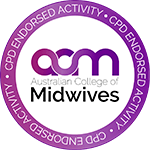PERSPECTIVES ON BIRTH AND PERINATAL CARE
View Online February 5th – May 31st 2021
This online conference brings together a faculty of leading experts from Australia and around the world to bring you the latest research and education in issues in birth and perinatal care.
Online conferences represent a cost effective and environmentally sustainable way of gaining education. We bring this learning experience right to your device – phone, tablet, laptop or computer.
ACCREDITATION: CERPs Approval Number C202104
Total CERPS allocated: 5L CERPs, 7.5 R CERPs and 2.75 E CERPs – Total hours 15.25
ACM Endorsed program 15.25 CPDs
Early Bird, Student and Group discounts available.
For any enquiries please email info@breastfeedingconferences.com.au
Virtual Exhibitors:
Positions are available in our virtual exhibit hall for WHO Code Compliant exhibitors. Please email info@breastfeedingconferences.com.au
